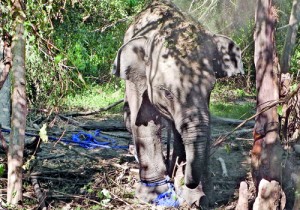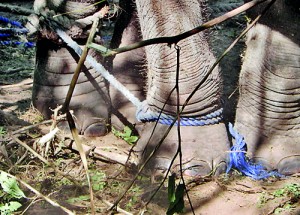News
Attempt to snatch baby elephant from wild
Hearing a baby elephant’s cries from the forest all Tuesday night, villagers called wildlife officials who thwarted an attempt to snatch the baby from the wild and sell it into captivity in private hands.
The officers had been expecting to find the elephant injured from an accident but instead found it tightly tied to trees with strong nylon ropes. Two armed men guarding the elephant fled when the officers appeared.

Saved in time: The captive baby elephant tied up to surrounding trees with strong nylon ropes
The incident was reported from Pahalagama in Galgamuwa which is famous for its elephants and tuskers. Wildlife Department sources say that the elephant was a male about two years old. It was well-built for its age and aggressiveness.
The tactics used to separate the baby elephant from the herd remain a mystery. It did not appear to have been physically harmed.
Officers later released it close to the resident herd of about 30 wild elephants and saw it reunited with its family.
It is believed the baby elephant, found on Wednesday (February 5) had been caught the previous day.
This is the first time Department of Wildlife Conservation (DWC) officials have thwarted a wild elephant kidnap at the scene of the crime.
News of a racket of snatching baby elephants from the wild emerged several years ago. It is believed about 60 such baby elephants have been taken.
Elephant calves released by the Elephant Transit Home (ETH) have been particular targets of these criminals.
Habarana and Udawalawe are the other major areas in which these racket are in operation, environmentalists say.
Last year, the Environmental Conservation Trust (ECT) released the whereabouts of 22 elephants believed to be illegally caught from the wild but no action has so far been taken. The list contains some high-level names.
Many of these elephants have ended up in temples and kept on public view and paraded openly in many of the key peraheras in the country.
 In Sri Lanka, births of privately owned captive elephants are not known. The Pinnawala Elephant Orphanage is the sole source of releasing baby elephants to private owners. A few elephants have been donated from countries such as India and Thailand for religious purposes. Other than these avenues, the existence of any young elephant in private ownership is questionable.
In Sri Lanka, births of privately owned captive elephants are not known. The Pinnawala Elephant Orphanage is the sole source of releasing baby elephants to private owners. A few elephants have been donated from countries such as India and Thailand for religious purposes. Other than these avenues, the existence of any young elephant in private ownership is questionable.
Although all captive elephants in Sri Lanka are supposed to be registered with the DWC it is alleged that these racketeers obtain fake birth certificates that purport to show the elephants are captive-born.
The DWC register was recently found to have been “lost”, and the head of legal affairs of the Department has been interdicted over the affair.
An attempt by the DWC to give a deadline for registering illegally-caught elephants enraged environmentalists who pointed out that the announcement gave gangs a window of opportunity to seize baby elephants from the wild and legalise their ownership as captive-born animals.
It is feared that this week’s attempt at Galgamuwa is linked with this situation.
Private owners of elephants lament that the number of captive elephants is decreasing and constantly urge the need of new blood, mainly to continue cultural activities that include elephants as an attraction. Many people, however, argue that this is against core Buddhist philosophy.
DWC Director-General H.D. Ratnayake rejected claims that his department is turning a blind eye on illegal elephant captivity even though all the details are given to the authorities. He said an investigation is being carried out to find those involved in attempt to rob the Galgamuwa baby elephant.

